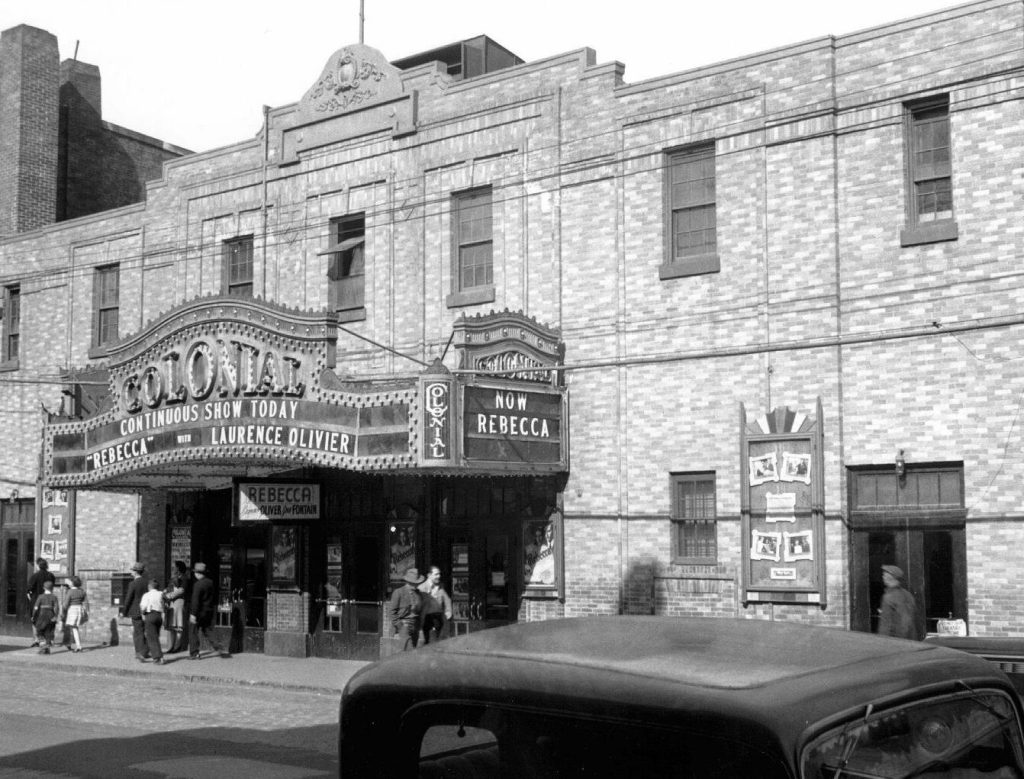It always hard to know when a city is reaching a turning point. For Augusta, that moment could be the eventual reopening of the Colonial Theater as a performance space and downtown anchor.
It’s easy to scoff. When I first ventured inside the theater – which long-time residents still remembered for showing Hollywood classics in the 1930s and ’40s – it looked like a bombed-out shell from a wartime movie.
The floor had collapsed. The roof had a huge hole in it, and sunlight filtered down to a maze of cobwebs and debris. The old concession stand, near the street, was about the only thing recognizable from a building that had been a showplace in its time.
The real estate agent – who was showing me the premises as part of a business story I was writing – talked a good game, but I found it impossible to share his optimism. Who in their right mind could imagine this becoming a theater again?
A few people could, as it turned out, including Richard Parkhurst, who brought a highly successful business to Augusta years ago, and, in retirement, has taken on rebuilding the Colonial as his cause. Kennebec Savings, the area’s largest bank, has taken an interest. So has the city, with financial support voted by the city council.
If you just look at the numbers, there’s a long way to go. Of the $6 million lower-end cost for full renovation, about $1 million has been raised so far.
Still, though real estate development, private and public, is all about the numbers, in the end it’s the idea – and whether it’s a good one – that makes or breaks a project. And, as a one-time skeptic, I am starting to come around.
I’ve written about Central Maine’s downtowns a bit lately, and there’s a model everyone has in the back of their heads: the spectacular success of downtown Portland, one of the most written-about and acclaimed small cities in the country.
The nascent revival of Maine’s largest city was already taking shape when I returned to the state in the 1980s, but it was relatively new. I recall a talk by one of the Portland pioneers, who happened to be from Massachusetts, at the Lithgow Library. He recounted the baffled looks he encountered at city hall when he said he planned to redevelop a couple of buildings on Exchange Street.
“Don’t you know there’s no one there besides homeless people and rats?” he was, in effect, told. Within a decade, Exchange Street was the hottest retail market in Maine.
Portland’s success is both inspiring and daunting – daunting because Maine has not fared well, economically and demographically, compared to the rest of the nation. For two decades, cities elsewhere in the state were shrinking, not growing, but that finally shows signs of turning around.
People not only want to live downtown again – something that’s already buoying Water Street – but the kinds of stores and business that are likely to thrive as the 21st century unfolds resemble more the downtown shops of the ’50s and ’60s than the gargantuan “big box” stores that arrived here in the ’90s, and are now being undermined by on-line shopping.
Yet downtowns need destination points, and thus far Augusta’s Water Street doesn’t have one. Some 30 years ago, the anchor seemed as if it might be the Key Bank building on Market Square, the first new construction downtown in decades. But the financial crisis that started with the Savings and Loan scandals in 1989 prompted Key Bank to move its headquarters to Portland, and some of its operations out of state.
Public spaces are thus more reliable points to build around that private businesses – as towns and cities throughout the nation are all too aware in the era of global capitalism. As a non-profit, a new Colonial Theater would be suitable, as would, in a different sense, a new police station at the end of Water Street, should that prove feasible.
The first stage is to achieve stability, as both downtown and the theater have managed to do. The next step is to look for opportunity.
The rebuilding of state government, under a new administration, is another necessary element if Augusta is to again become a destination, rather than a commuting stop for most of those who work there.
So the hiring of an executive director, with experience in the field, to manage the Colonial and try to bring it back, is the kind of leap of faith one could look back on, later, as decisive. Success is far from guaranteed, but it no longer seems impossible.
Douglas Rooks has been a Maine editor, opinion writer and author for 34 years. He is the author of “Rise, Decline and Renewal: The Democratic Party in Maine,” and welcomes comment at: drooks@tds.net
Send questions/comments to the editors.



Success. Please wait for the page to reload. If the page does not reload within 5 seconds, please refresh the page.
Enter your email and password to access comments.
Hi, to comment on stories you must . This profile is in addition to your subscription and website login.
Already have a commenting profile? .
Invalid username/password.
Please check your email to confirm and complete your registration.
Only subscribers are eligible to post comments. Please subscribe or login first for digital access. Here’s why.
Use the form below to reset your password. When you've submitted your account email, we will send an email with a reset code.